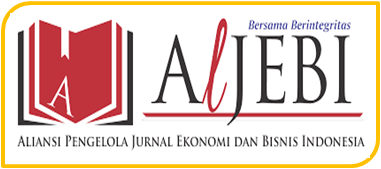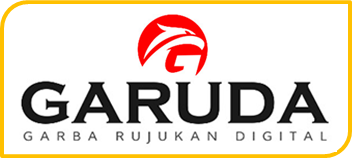The Evolving Landscape of Real Sector Halal Industry Research: A Bibliometric Approach
Abstract
Keywords
Full Text:
PDFReferences
Abderahman Rejeb, K. R., & Zailani, S. (2021). Are Halal Food Supply Chains Sustainable: A Review And Bibliometric Analysis. Journal of Foodservice Business Research, 24(5), 554–595. https://doi.org/10.1080/15378020.2021.1883214
Ahmad, Z., Mafaz, M. N. A., & Rahman, D. M. M. (2023). Harmony in Halal: Understanding Stakeholder Views Analyzing Products and Evaluating Policies in Malaysia. West Science Business and Management, 1(05), 495–508. https://doi.org/10.58812/wsbm.v1i05.358
Ali, M. H., Chung, L., Kumar, A., Zailani, S., & Tan, K. H. (2021). A sustainable Blockchain framework for the halal food supply chain: Lessons from Malaysia. Technological Forecasting and Social Change, 170, 120870.
Amalia, E., & Hidayah, N. (2020). Strategies for Strengthening Halal Industries towards Integrated Islamic Economic System in Indonesia: Analytical Network Process Approach. Al-Iqtishad: Jurnal Ilmu Ekonomi Syariah, 12(1).
Amalia, E., Rahmatullah, I., Muslim, M. B., & Fathoni, M. (2023). ENHANCING HALAL ECONOMY ECOSYSTEM FOR STRENGTHENING HALAL BUSINESS SME’S SECTOR IN INDONESIA. Journal of Namibian Studies: History Politics Culture, 34, 7015–7037.
Antonio, M. S., Rusydiana, A. S., Laila, N., Hidayat, Y. R., & Marlina, L. (2020). Halal Value Chain: A Bibliometric Review Using R. Library Philosophy and Practice, 2020, 1 – 25. https://www.scopus.com/inward/record.uri?eid=2-s2.0-85115660888&partnerID=40&md5=96db3b70491513c3f47f798e54f89faa
Aria, M., & Cuccurullo, C. (2017). bibliometrix: An R-tool for comprehensive science mapping analysis. Journal of Informetrics, 11(4), 959–975. https://doi.org/10.1016/j.joi.2017.08.007
Azali, M., Kamal Basha, N., Chang, Y.-S., Lim, X.-J., & Cheah, J.-H. (2023). Why not travel to Malaysia? Variations in inbound tourists’ perceptions toward Halal-friendly destination attributes. Journal of Hospitality & Tourism Research, 47(1), 177–206.
Azam, M. S. E., & Abdullah, M. A. (2020). Global halal industry: realities and opportunities. IJIBE (International Journal of Islamic Business Ethics), 5(1), 47–59.
Baas, J., Schotten, M., Plume, A., Côté, G., & Karimi, R. (2020). Scopus as a curated, high-quality bibliometric data source for academic research in quantitative science studies. Quantitative Science Studies, 1(1), 377–386. https://doi.org/10.1162/qss_a_00019
Baharuddin, K., Kassim, N. A., Nordin, S. K., & Buyong, S. Z. (2015). Understanding the halal concept and the importance of information on halal food business needed by potential Malaysian entrepreneurs. International Journal of Academic Research in Business and Social Sciences, 5(2), 170.
Chaudry, M. M., & Regenstein, J. M. (1994). Implications of biotechnology and genetic engineering for kosher and halal foods. Trends in Food Science & Technology, 5(5), 165–168.
Cobo, M. J., López-Herrera, A. G., Herrera-Viedma, E., & Herrera, F. (2011). Science mapping software tools: Review, analysis, and cooperative study among tools. Journal of the American Society for Information Science and Technology, 62(7), 1382–1402. https://doi.org/https://doi.org/10.1002/asi.21525
Damit, D. H. D. A., Harun, A., & Martin, D. (2017). Key Challenges and Issues Consumer Face in Consuming Halal Product. International Journal of Academic Research in Business and Social Sciences, 7(11), 590–598. https://doi.org/10.6007/ijarbss/v7-i11/3498
Damit, D. H. D. A., Harun, A., Martin, D., Othman, B. J., Othman, B., & Ahmad, H. (2019). What makes a non-muslim purchase halal food in a muslim country? An application of theory of planned behaviour. Management Science Letters, 9(12), 2029–2038. https://doi.org/10.5267/j.msl.2019.7.003
Darmawati, Hardiana, D., Mainata, D., & Nuryadin, M. B. (2023). Halal Industry: A Literature Bibliometric Analysis on Halal Studies. Mazahib Jurnal Pemikiran Hukum Islam, 22(1), 175 – 211. https://doi.org/10.21093/mj.v22i1.5477
DinarStandard. (2023). State of the Global Islamic Economy Report.
Donthu, N., Kumar, S., Mukherjee, D., Pandey, N., & Lim, W. M. (2021). How to conduct a bibliometric analysis: An overview and guidelines. Journal of Business Research, 133, 285–296. https://doi.org/https://doi.org/10.1016/j.jbusres.2021.04.070
Eck, N. J. van, & Waltman, L. (2023). VOSviewer Manual 1.6.20.
El-Gohary, H. (2020). Coronavirus and halal tourism and hospitality industry: Is it a journey to the unknown? Sustainability, 12(21), 9260.
Elasrag, H. (2016). Halal industry: Key challenges and opportunities.
Hidayat, S. E., Rafiki, A., & Nasution, M. (2021). Bibliometric Analysis and Review of Halal Tourism. Signifikan: Jurnal Ilmu Ekonomi, 10(2), 177–194.
Hidayat, S. E., Rafiki, A., & Nasution, M. D. T. P. (2022). Halal industry’s response to a current and post-COVID-19 landscape and lessons from the past. Journal of Islamic Marketing, 13(9), 1843–1857.
Hidayati, J., Vamelia, R., Hammami, J., & Endri, E. (2023). Transparent distribution system design of halal beef supply chain. Uncertain Supply Chain Management, 11(1), 31–40. https://doi.org/10.5267/j.uscm.2022.12.003
Hosain, M. S. (2021). Branding “Halal”: application of a certain religious emotion to attract a specific customer segment. PSU Research Review, 5(3), 195–200. https://doi.org/10.1108/PRR-12-2020-0043
Idris, P. S. R. P. H., Musa, S. F. P. D., & Sumardi, W. H. H. (2022). Halal-Tayyiban and Sustainable Development Goals: A SWOT Analysis. International Journal of Asian Business and Information Management, 13(2), 1–16. https://doi.org/10.4018/IJABIM.20220701.oa9
Islam, M. M. (2022). Evaluating negative attitudes of the students and shoppers towards halal cosmetics products. Journal of Islamic Marketing, 13(3), 565–585.
Jia, X., & Chaozhi, Z. (2020). “Halal tourism”: is it the same trend in non-Islamic destinations with Islamic destinations? Asia Pacific Journal of Tourism Research, 25(2), 189–204.
Jia, X., & Chaozhi, Z. (2021). Turning impediment into attraction: A supplier perspective on Halal food in non-Islamic destinations. Journal of Destination Marketing & Management, 19, 100517.
Khalid, N. R., Che Wel, C. A., & Mokhtaruddin, S. A. (2021). Product positioning as a moderator for halal cosmetic purchase intention. Interdisciplinary Journal of Management Studies (Formerly Known as Iranian Journal of Management Studies), 14(1), 39–60.
Laluddin, H., Haneef, S. S. S., Saad, N. M., & Khalid, H. (2019). The scope, opportunities and challenges of Halal industry: Some reflections. International Journal of Economics, Management and Accounting, 27(2), 397–421.
Lim, W. M., & Kumar, S. (2024). Guidelines for interpreting the results of bibliometric analysis: A sensemaking approach. Global Business and Organizational Excellence, 43(2), 17–26.
Maksum, A., Fauzan, A., & Ahmadi, S. (2019). The Role of the Indonesian Muslim Community Identity in Strengthening Indonesia-Malaysia Relations. MIMBAR: Jurnal Sosial Dan Pembangunan.
Masood, A. (2021). Factors Influencing Halal Cosmetics Purchase Behaviour of Working Adults and University Students in Malaysia. Personalia Pelajar, 24(1). https://doi.org/10.17576/personalia.2401.2021.06
Mu’ti sazali, A., & Ligte, J. S. (2019). The Importance of Halal Logistics Implementation in Indonesia in Compliance with Domestics and Global Halal Market Requirements. Jurnal Transportasi Multimoda, 17(2). https://doi.org/10.25104/mtm.v17i2.1319
Nisa, E. F. (2023). Transnational halal networks: INHART and the Islamic cultural economy in Malaysia and beyond. Global Networks, 23(3), 557–569.
Rejeb, A., Rejeb, K., & Zailani, S. (2021). Are Halal Food Supply Chains Sustainable: A Review And Bibliometric Analysis. Journal of Foodservice Business Research, 24(5), 554 – 595. https://doi.org/10.1080/15378020.2021.1883214
Rusydiana, A. S., Aswad, M., Pratomo, W. A., Hendrayanti, E., & Sanrego, Y. D. (2021). Halal Tourism Indicators: A Bibliometric Study. Library Philosophy and Practice, 2021, 1 – 21. https://www.scopus.com/inward/record.uri?eid=2-s2.0-85110454601&partnerID=40&md5=4951c971902b575b8174071b32838de0
Universiti Kebangsaan Malaysia. (2024). Prof. Ts. Dr. Mohd Helmi Bin Ali.
Van Eck, N., & Waltman, L. (2010). Software survey: VOSviewer, a computer program for bibliometric mapping. Scientometrics, 84(2), 523–538.
Wannasupchue, W., Mohamad, S. F., Ishak, F. A. C., & Ungku Zainal Abidin, U. F. (2023). Challenges to obtain halal certification among restaurants in northeast Thailand. Journal of Islamic Marketing, 14(2), 607–621.
Wibowo, M. W., Permana, D., Hanafiah, A., Ahmad, F. S., & Ting, H. (2021). Halal food credence: do the Malaysian non-Muslim consumers hesitate? Journal of Islamic Marketing, 12(8), 1405–1424.
Yagmur, Y., Ehtiyar, R., & Aksu, A. (2020). Evaluation of halal tourism in terms of bibliometric characteristics. Journal of Islamic Marketing, 11(6), 1601 – 1617. https://doi.org/10.1108/JIMA-05-2019-0101
Yazid, F., Kamello, T., Nasution, Y., & Ikhsan, E. (2020). Strengthening Sharia Economy Through Halal Industry Development in Indonesia. International Conference on Law, Governance and Islamic Society (ICOLGIS 2019), 86–89.
Zakaria, Z., Ramli, S. Q., Shoid, N. S. Z. M., & Sulaiman, A. (2022). MAPPING HALAL COSMETICS RESEARCH: A BIBLIOMETRIC ANALYSIS. Malaysian Journal of Syariah and Law, 10(1), 63 – 75. https://doi.org/10.33102/mjsl.vol10no1.384DOI: https://doi.org/10.18860/miec.v4i1.28844
Refbacks
- There are currently no refbacks.

This work is licensed under a Creative Commons Attribution-ShareAlike 4.0 International License.
Editorial Office:
Megawati Soekarnoputri Building
Faculty of Economics
Jln. Gajayana 50 Telp (0341) 558881
E-mail: m-iecjournal@uin-malang.ac.id
UIN Maulana Malik Ibrahim Malang
Member of:
Indexed by:
Maliki Islamic Economics Journal under a CC BY SA 4.0 International License.
View My Stats


























